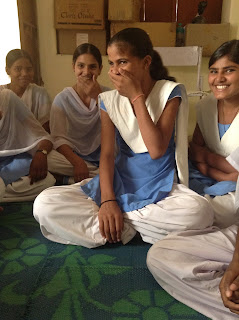


“Many girls in my class have dropped out this year, but I will complete my studies,” says 15-year old Vimal with a bright smile. “I want to be a police officer when I grow up. I want to do something which will make everyone in the village proud of me” she says. Others in the group of about 15 girls slowly speak up as well, and each reveals a similar ambition. Some want to be teachers, others want to be nurses, but almost all of them express a desire to make a difference by serving the communities they live in.
When we tell them, about Akshada, the maternal and child health program that we run in Rajasthan, they are quick to respond with interesting questions and observations they have on the topic.
“Kya aap tika-karan karwaenge” (will you get children immunized); “garbhvasta mei hari sabzi khani chahiye (one should eat green vegetables during pregnancy); “kya aap unn bachon ka illaj karenge jinka vazan kam hai (will you treat those children who weigh less)?
They were not only keen to know what we were attempting through our program, but also remarkably insightful about the issues and challenges that we were most likely to face, saying, for example, that it would be difficult to explain changes in approaches to elders in the community. When Vimal followed us till her school compound to ask us whether we will be back and as promised tell her more about our work, we knew we had to come back.
In the weeks to follow many such interactions led us to believe in the vast potential of adolescent girls in villages in Rajasthan to be change agents. Like Vimal, there are hundreds of girls who are aspiring to finish school, to be recognized, to be aware of the problems facing their communities, and to do something for their communities.
In some of the villages in Rajasthan that the Antara Foundation serves, we are starting to co-opt several of these change makers as part of our ambitious Akshada program aimed at bringing about dramatic improvements in health outcomes in the state.
Chief among our initiatives over the first year of the program has been an effort to focus the work of frontline healthcare staff on the neediest beneficiaries. Looking ahead, we believe that a large part of the success of our mission will come from generating community involvement to drive demand for healthcare services. This will help not only in holding the delivery mechanism accountable for the quality of healthcare service delivery but also in driving demand for services from beneficiaries, especially those who currently cannot—or will not—participate in consuming healthcare services. For example, by some estimates, as few as 25% of pregnant women receive all four antenatal check-ups that they are supposed to receive during the course of their pregnancy.
The barriers to receiving these check-ups are real—from a loss of income from daily wages, to real or perceived discrimination at service delivery points. However, improved healthcare outcomes require that we have more informed and empowered beneficiaries who demand and receive all the services needed to ensure safe deliveries. The lives of mothers and children depend on it, not to mention the integrity of families and future wage-earning capacities.
This is where we think Vimal and her fellow adolescent girls have a major role to play. These adolescent girls, some still in school, others having recently dropped out, were all very excited, when we spoke with them about it, at the thought of partnering with us to help support their local communities. Armed with training from us and from frontline healthcare workers on some of the basic concepts of maternal and child health, many of these girls have already become force-multipliers for our program.
They are helping ensure pregnant women in their mohallas (neighbourhoods) regularly take their iron and folic acid tablets. They are helping ensure that any young children showing signs of malnourishment are given appropriate care and treatment at the earliest. They are shadowing the frontline worker on her regular rounds in the community, helping potentially train a future cadre of such workers. Above all else, they are becoming aware and empowered themselves as young women who will one-day start families of their own.
If you have thoughts or suggestions on other ways to empower communities, we would love to hear them. Please do drop us a message via this blog, or via our social media channels. We look forward to hearing from you.